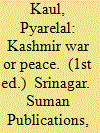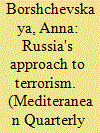| Srl | Item |
| 1 |
ID:
139342


|
|
|
|
|
| Summary/Abstract |
Ayaan Hirsi Ali is correct that darker passages of Islamic Scripture endorse violence and prescribe harsh punishments for moral or theological infractions. And she is right that in many Muslim countries, too many citizens still think it is a good idea to kill people for apostasy, stone them for adultery, and beat women for disobedience just because Scripture says so. But Hirsi Ali is profoundly wrong when she argues that Islamic Scripture causes Muslim terrorism and thus that the U.S. government should fund Muslim dissidents to reform Islam.
|
|
|
|
|
|
|
|
|
|
|
|
|
|
|
|
| 2 |
ID:
134100


|
|
|
|
|
| Publication |
2014.
|
| Summary/Abstract |
A specter is haunting Europe-fear of the impact hundreds of European volunteers to the Syrian jihad might have on their home countries once they return. Perhaps nowhere is the potential danger of this Syrian blowback greater than in the Balkans. According to one estimate, Bosnia has provided more volunteers per capita for the Syrian jihad than any other country in Europe, and various reports suggest there are probably more than five hundred jihadis from southeastern Europe now in Syria.
|
|
|
|
|
|
|
|
|
|
|
|
|
|
|
|
| 3 |
ID:
046062


|
|
|
|
|
| Edition |
1st ed.
|
| Publication |
Srinagar, Suman Publications, 2003.
|
| Description |
vi, 287p.hbk
|
|
|
|
|
|
|
|
|
|
|
|
Copies: C:1/I:0,R:0,Q:0
Circulation
| Accession# | Call# | Current Location | Status | Policy | Location |
| 046865 | 954.6/KAU 046865 | Main | On Shelf | General | |
|
|
|
|
| 4 |
ID:
124584


|
|
|
|
|
| Publication |
2013.
|
| Summary/Abstract |
In the last two decades, Muslim minorities have organized politically as Muslims (as opposed to ethnic or national identities) to influence foreign policy in the United States, Canada and the United Kingdom. This paper evaluates to what extent and in what ways Muslim identity impacts upon the determination of the foreign policy interests and lobbying of Muslim interest groups in these pluralist democracies, as compared to other variables at the national and organizational levels. Analysis is based largely on primary documents, such as press releases and newsletters, issued by five leading Muslim interest groups in the US, Canada and the UK, as well as interviews with the leaders of these organizations.
|
|
|
|
|
|
|
|
|
|
|
|
|
|
|
|
| 5 |
ID:
126683


|
|
|
|
|
| Publication |
2013.
|
| Summary/Abstract |
A superficial look at Russia's current problems with terrorism and Muslim extremism may lead to the conclusion that the United States and Russia have similar views on this issue, which would therefore make them obvious partners in addressing the problems. Russian president Vladimir Putin promoted this position in the aftermath of the 11 September 2001 attacks in the United States and renewed this claim after the Boston Marathon bombing of April 2013. However, the Kremlin's view on terrorism is different from Washington's. The history of Russian domination and abuses in the Caucasus, the chaos and poverty that followed the breakup of the Soviet Union, and the Kremlin's human rights violations in Chechnya in many ways contributed to the rise of terrorism and Muslim extremism in Russia. In addition, the Kremlin uses terrorism as an excuse for an increased crackdown on civil society and for the lack of democratization in Russia. The Barack Obama administration therefore should have no illusions about the limitations on US-Russian cooperation on terrorism
|
|
|
|
|
|
|
|
|
|
|
|
|
|
|
|